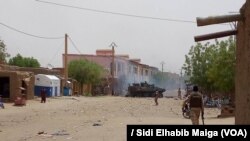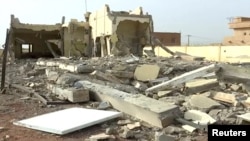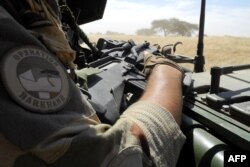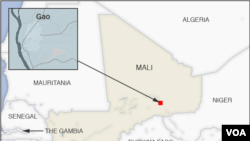Islamist militants have been a major problem in Mali since at least 2012, when armed jihadists briefly took over the northern half of the country. But not all the young men who join armed groups in the region — including Islamist ones — are motivated simply by religion. According to researchers, many join armed groups for reasons that are practical, which if addressed could provide some solutions to conflict.
The threat from armed Islamist groups in the vast Sahel region seems to be worsening on some fronts.
On Friday, an explosion and gunfire severely damaged the regional G5 Sahel Force headquarters in Central Mali, killing at least three soldiers. On Sunday in Gao, Mali's largest northern town, Islamist militants killed two Malian citizens and wounded four French military personnel.
The Support Group for Islam and Muslims has now claimed both attacks. But names can be misleading. Some experts on the Sahel argue that those who join armed groups in the region are not primarily motivated by religious fanaticism.
Ibrahima Maïga, a Malian researcher at the Institute for Strategic Studies, says the main driver for many of the young men who join armed groups is economic.
"People joining armed groups are not necessarily poor, he argues, but they have economic interests to protect, such as lucrative smuggling operations of petrol, cigarettes, food, medicines, cocaine, and even people. Or they simply want to protect their cattle against thieves," he said.
Human Rights Watch researcher Corinne Dufka says that in parts of Mali, there is insecurity on all sides.
"I spent a lot of time talking to villagers who live in Ségou and Mopti regions, in Central Mali. And they mention a number of things. One of them is abuses committed by the security forces. They also talk about the lack of protection and how they feel vulnerable at the hands of armed bandits. And lastly they talk about endemic corruption that has been going on for decades," she said. "Interestingly, the armed Islamic groups very strategically exploited these grievances with the state, to recruit quite effectively large numbers of people from those villages and towns in Central Mali."
Maïga and his colleagues do not say that religion plays no role at all — but argue that the overriding motives are practical.
Abdelhak Bassou is based at the OCP Policy Center in Rabat, Morocco, which recently organized a conference on peace and security in the region. He suggests a straightforward solution: be as practical as the people you are fighting.
Like everybody else, the populations of the Sahel want to see their needs met, Bassou says. And if this does not happen, people tend to rebel and this can take many forms. In the towns and cities you take to the streets, he says. But, in the vast rural areas of the Sahel this is clearly not going to work. So here the options are: Mafia style racketeering networks, illicit trade or armed groups — jihadist or otherwise. And very often these activities are carried out by the same people, says Bassou.
Fighting corruption and establishing accountable authorities is no easy task for governments that struggle to provide even basic services of security, education, and health care.
But, fail to provide some hope for the future, argues Bassou, and you'll have an eternal rebellion on your hands — call it Islamist or otherwise.







